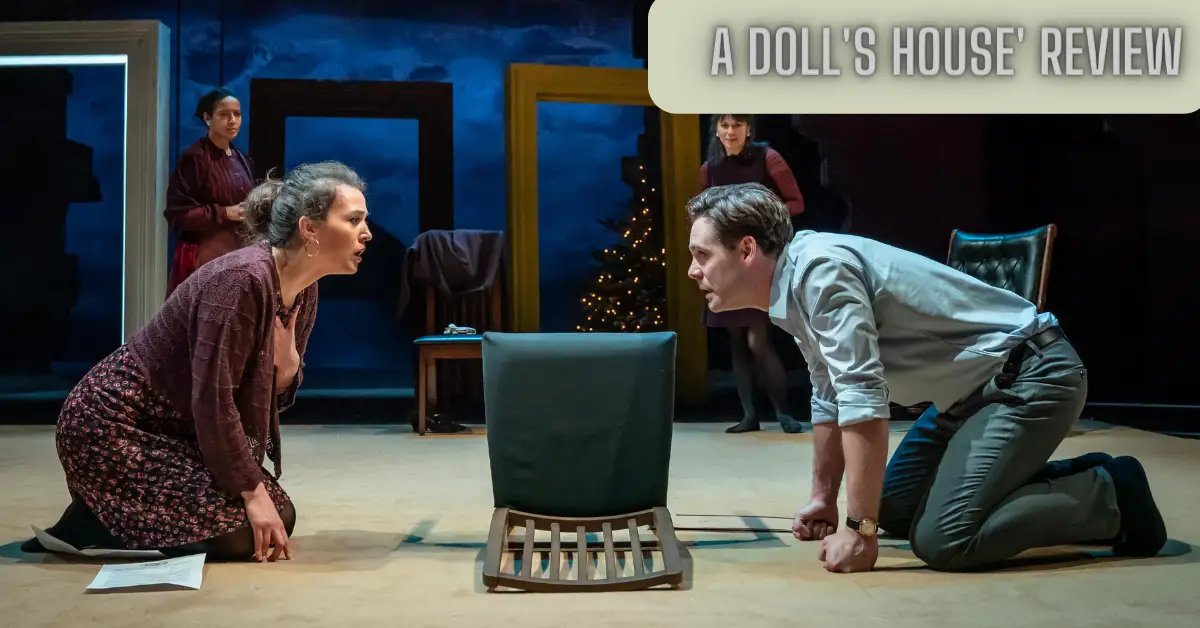In Jamie Lloyd’s adaptation of Henrik Ibsen’s drama, there are no props in “A Doll’s House” Neither sets nor costumes (only simple modern attire in dark blue) were present. There are no children, a dress that needs mending, a mailbox, a letter, or a cigar to be smoked. Ibsen wrote his play in three acts, but there aren’t any in this one. The theater’s enormous, empty stage, the building’s industrial brick walls, whose paint has faded from show to performance, and a few stacked wooden chairs are all visible when you walk in.
Oh, and Jessica Chastain, who is wearing a straightforward blue dress and has her red hair pushed back, is circling the stage slowly while sitting on a wooden chair on a turntable. It’s difficult to tell if she is acting as Nora, a devout wife and mother of three young children who is finally about to escape relative poverty as the play opens because her husband, Torvald (Arian Moayed), has been promoted at the bank where he works, or if it is Chastain herself calmly watching the audience members file in and find their seats.
The rest of the ensemble gradually appears, pulling chairs from a stack, arranging them in various locations, and sitting motionless with their backs to Chastain. So what’s left in the theater when almost all of the audience’s expectations — especially from a Broadway play — is stripped away?
What’s remained in this staging is a lovely, expansive clarity about the themes of this frequently staged play, the characters, what they represent to one another, and how they could (or might not) affect modern audiences. There is only conversation, which playwright Amy Herzog (the unusual lady interpreting) has condensed “A Doll’s House,”
( least on Broadway) and were expertly portrayed by the majority of the players in the play. As a result, the narrative is unmuddled by the normal strutting and worrying: When Nora is blackmailed by Krogstad (Okieriete Onaodowan), a coworker of Torvald’s at the bank whom Nora secretly borrowed money from years ago when Torvald was ill, forging her father’s name on the promissory note because she needed to save her husband’s life, her happiness over Torvald’s promotion is dashed.
Have A Look At Some Of The Latest Trending News:
- Disney CEO Bob Iger Says It’s Time For ‘Newness’ From Marvel Movies
- ‘Dilbert’ Comic Strip Dropped By Newspapers Over Scott Adams’ Racist Comments
Nora must step in to stop Krogstad from exposing her crime to her husband and the world, which will ruin Nora and, by implication, Torvald. Krogstad is aware that Torvald, in his new position, will fire him.
But of course, let’s get back to that actress on the turntable, who is so unobtrusive when people enter the theater that they hardly see her. While the other characters in this play wander around the stage without restriction, Nora hardly ever stands. She occasionally rounds the space while sitting on her chair like a quiet doll, which is a fitting metaphor for a lady who has never, ever, imagined escaping her husband’s gravitational pull, marital expectations, or social constraints.
It turns out that Nora’s opinions have been shaped by others, particularly domineering men, starting with her father when she was a child, like other women of her period (if, in fact, we’re still in the 19th century). Until this evening, on this empty stage, when even an audience facing her direction doesn’t notice her, this pull, this force, has Nora in its grip.
The other thing left on this otherwise empty stage is the effect of one body on another — body language — another kind of gravitational pull, but one easily overlooked, ignored, or sidelined by the shiny theatricalities we’ve come to expect from Broadway productions. However, words, no matter how brilliant, can be deceiving.
In this perfectly portrayed production by Michael Patrick Thornton, Nora’s relationship with Dr. Rank, her husband’s best friend, is what starts to make her recognize the sad truth of her life. The chemistry is obvious; it is unadulterated, joyous, sweet, and completely at ease. Chastain’s Nora comes alive with Rank, and they glitter in each other’s presence. Rank is such a plainly wonderful man who accepts Nora for who she is that her laughing, as she leans towards him, is not so much joyous as it is bawdy.
Perhaps Nora would have continued to ignore the reality and strength of their basic intimacy if Rank had not revealed his impending death; perhaps he would have continued to pay her visits rather than saying farewell for good (and confessing his love for her).
Dr. Rank’s final farewell to Nora in this bare-faced play is the gaping hole in her life’s facade. As time goes on, Nora realizes that everything she has ever thought, felt, or believed about her life has been untrue. She never guessed this, but her husband wouldn’t sacrifice anything for her. He can’t even stay next to her for more than a minute before drifting off into his world, where she has no business being.
This play is stunning, and it’s a relief to be spared the spectacle in favor of a more straightforward interpretation of Ibsen’s intentions. There are many silent tears and no handkerchiefs to wipe them away because there are no props, yet despite Chastain’s reserved acting, you can see how each special moment registers on her face. And Moayed is effective as Torvald, a character who, on the surface, appears to be a devoted, caring husband but is egotistical, shallow, ungrateful, and narcissistic.
Up until the very end of the play, it makes no difference whether it’s 1879 up there on stage or 2023; in fact, it’s electrifying. It is clear that experiences like marriage, parenting, financial difficulties, friendship, family secrets, and even white-collar crime are timeless and common. But in 2023, Nora’s final insight that she needs to leave behind everything she knows in order to find herself comes across as less than cathartic. It is carried out as a sign of liberation, a woman calling out to all women to stop orbiting and forge forth unhindered by preconceived notions.
This is a crucial first step for Nora on the path to awakening and enlightenment, and in 1879, it must have been equally thrilling and shocking. But one hopes we’re a little further forward for the other women in the crowd.



Leave a Reply